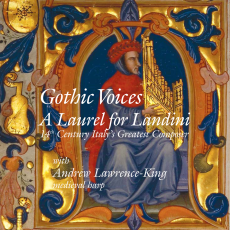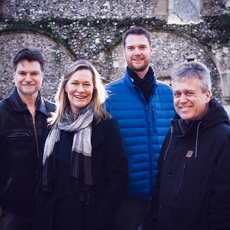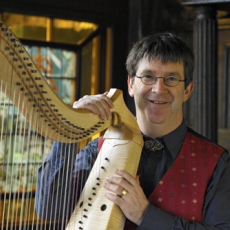Gothic Voices - A Laurel for Landini - MusicWeb International
The cover of this CD is a reproduction of a famous page of the Squarcialupi Codex. It shows the (to us somewhat more obscure) composer Francesco Landini (c.1325-1397) wearing a crown of laurel. It's believed that this was in celebration of an honour extended to him by the Venetians in the 1360s, when he was judged the most outstanding musician of his age.
Whether or not this illustration reflects facts, it does attest to Landini's reputation - as the greatest composer of the Italian ars nova. In their new recording, specialists in the field of mediaeval vocal music, Gothic Voices pay their own tribute to Landini by presenting a dozen and a half or so pieces of his own, surrounded by similar (and contrasting) music by a couple of named contemporaries; and half a dozen anonymous works.
The CD is a delight. It contains music which is focused; intimate without being breathily urgent; lightly melodious and shot through with clean, expressive singing - and playing in some numbers by mediaeval harpist, Andrew Lawrence-King.
Gothic Voices have the gift of being able to bring such music to life so effortlessly. For example, Deh, dinmi tu [tr.6] bowls and springs along almost as though it had just tumbled from Landini's mind. But their conception is neither random nor cursory: immediately afterwards they concentrate all the intensity and pain of a longing lover into under two minutes in De sospirar sovente [tr.7].
To look at the text of the piece is to see why it works as well as it does. The words are restless and searching and that is just how Gothic Voices has approached this performance. The text, the expression of the sentiments to which Landini and his contemporaries were responding in their music, are primary. So Gothic Voices make every word audible. They do this undeliberately. Yet with a kind of 'group authority' that only arises out of great familiarity with the idiom and the intentions of the composers.
So the pieces, which either begin in monody or are either entirely unharmonised (such as Ave Maria, stella Diana [tr.9]) sound unforced, linear - calm, almost. This approach very persuasively leads us into Landini's world, where listeners' focus must have been as much on the words and melody as on the performers' filters through which they were first heard; however great was Landini's reputation. Perhaps by allowing touches of spontaneity and freedom in rhythm and vocal texture to remain, Gothic Voices have captured very effectively the rough edges of fourteenth century Italy without making the articulation sound crude or unpolished.
It's the vigour, the at times relentless striving inherent in sexual love, and the love of a God, which strike us. But not such longings as those experienced by madrigalists two hundred years later, which almost strike us as allusions. The singers of Gothic Voices have entered sufficiently far into the world of Landini and his contemporaries to make these short, incisive compositions very real. Pain not ache: listen to the counterpoint in Così pensoso [tr.13], for example. Not meandering. Nor pat summary. Nor yet breaking off in the midst of the suffering. Still less a therapeutic outpouring. These works are conceived as a distillation of common experience - expressed with great openness and a certain detachment borne of the technical (musical) skill of the composer communicating directly with musicians who possess such skills in our time. Here there is no indulgence to the feelings. This is nowhere better exemplified than in the vigour of Musica son [tr.15]. It's brief, pointed and without a spare note. We are left wanting more.
This is an exciting, profound and excellently executed CD. All lovers of 'early' vocal music in general and of ars nova and/or Gothic Voices' extensive and outstanding recorded repertoire will want to look closely at it. Those new to the period and style will be struck by the purity and persuasion of the performances: the music as performed here has an appeal of its own right such that repeated listening will neither tire nor puzzle. The recording is clean and present. The choice of music to illustrate their theme both persuasive and enjoyable in its own right. As an introduction to Landini and his genre or as just over an hour of continuous pleasure, 'A Laurel for Landini' could well find its way onto gift lists for the upcoming holidays.



